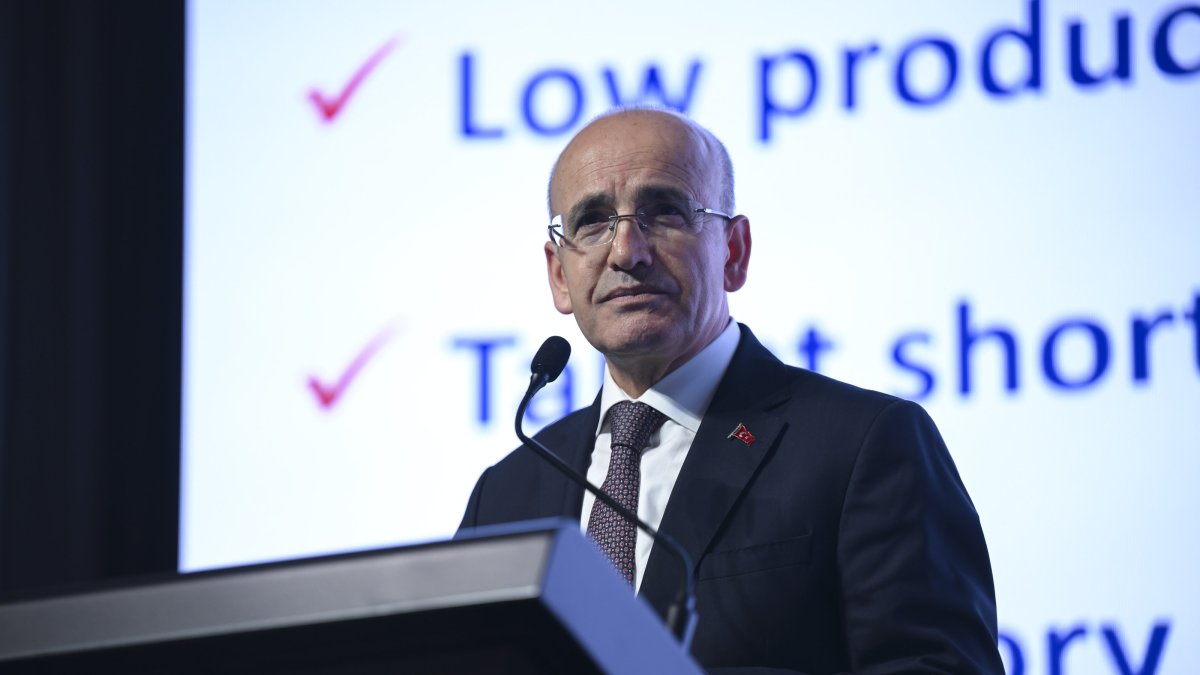Türkiye’s economic program is yielding results within the general framework Ankara had envisioned and has “overcome two major shocks,” Treasury and Finance Minister Mehmet Şimşek said Thursday, stressing that inflation would continue to fall.
The minister, speaking to private broadcaster NTV, reiterated the goal of reducing inflation to single digits.
“There is significant progress there: Inflation is falling and will continue to fall,” Şimşek said in response to a question about how he sees the results of the program that has been implemented for nearly two years.
Annual inflation in Türkiye slowed down to 35.4% in May, its lowest since late 2021 and is less than half the level that it reached a year earlier, according to the official data.
Stating that another important target is a sustainable current account deficit, Şimşek said that they foresee a transition to a current account surplus in the long term. The current account deficit has been below 1% of national income for a long time, according to the minister.
Moreover, he touched upon the FX-protected accounts, the so-called KKM scheme, recalling that exit from it is also another significant goal.
Şimşek drew attention to the fact that the volume of KKM accounts has dropped below $15 billion and noted that they will “probably end this practice soon.”
The Turkish central bank, in its yearly road map for 2025, said it aimed to end the foreign exchange-protected Turkish lira deposit scheme, which has weighed on the budget, this year.
The authorities began to scale back the KKM scheme in August of 2023, following a general shift to more conventional macroeconomic policy and since then, the volumes of these accounts have been declining.
“When you look at the reserves, there is an increase of over $90 billion in net reserves compared to the end of May 2023. There is also an increase of $55 billion-$60 billion in gross (reserves). Therefore, the program is yielding results within the framework foreseen,” the minister further said.
“Inflation is declining, and the budget deficit is decreasing. The current deficit has decreased and is at a sustainable point. We have reduced some risks … We have increased the resilience of the economy and made it resistant to external and domestic shocks,” he added.
Moreover, he said that the program “has overcome two major shocks.”
Program ‘tested’
“This program has overcome two very important shocks, initially domestic and later external, in March and April and has proven its credibility,” he stated.
“In fact, this program has been tested and there is a clear success,” he added.
“A program that has managed to withstand two major shocks back-to-back means that it has strengthened Türkiye’s economic structure and increased its resilience,” according to the minister.
He went on to say that there were exits amid turbulence, but underlined that a significant portion of those have come back.
The Central Bank of the Republic of Türkiye (CBRT) has indeed bought more foreign currency in recent weeks after declines in March and April.
Brief market turmoil in March following the detention and jailing of Istanbul Mayor Ekrem Imamoğlu amid a graft probe and growing protectionist measures prompted a policy pivot by the central bank, which hiked interest rates in April.
However, amid a larger-than-expected decline in annual inflation, markets are now eagerly awaiting the bank’s next committee meeting set for upcoming Thursday to see the future of the policy path.
Pointing out that country risk premiums (CDS) are falling, reserves are increasing, and the exit from the KKM continues, Şimşek reiterated that the program has proven itself and “has not gone off the rails.”
Furthermore, elaborating on inflation, he maintained that stickiness in services inflation is preventing further improvement in headline inflation, which he said, without it, could be below 30%.
“There has been a 40-point decrease in inflation in the last year. Goods inflation fell to 28.7% as of May. In fact, inflation in basic goods has fallen to 20%. One of the main factors that keeps inflation high, currently at 35.4%, is services,” Şimşek said.
“We were saying last year at this time that we were on the verge of a permanent decline in inflation. Now we are in it,” he also said, adding that the downward trend would continue.
Underlining that they expect inflation to end the year in the 20s, Şimşek recalled the central bank’s range between 19% and 29%.
“We will be within the target range. We sincerely believe in this,” he said.

